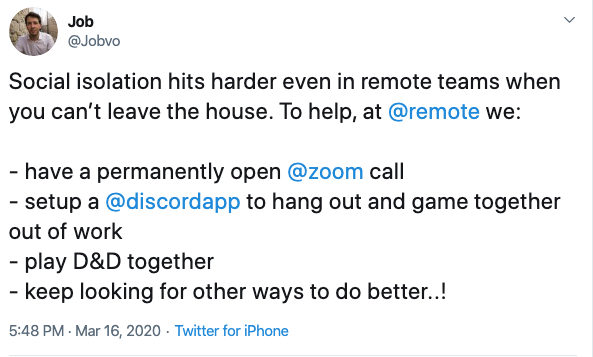Besides communication, mental health and isolation are the most common things that remote workers struggle with and one of the main reasons for dissatisfaction of remote workers. Most remote companies are aware of this, implement and test multiple ways to get around these issues and make a constant effort fighting this.
In this post, we are taking a look at ways that remote companies can help fighting these issues according to practical examples, and introduce a few applicable ways that remote teams can use today to improve overall mental health, fight isolation and therefore create a more productive team.
Creating awareness
The first step towards creating a better team culture is to recognize that these challenges exist and spreading awareness that it is okay to talk about those. This creates a more open work culture where common mistakes can be pointed out and solved before anything bad can happen. Namely, remote workers struggle with:
- Boundaries between work and life, leading to longer work hours
- Isolation, especially when living alone
- Burnout
- Lack of social interaction
Life has to be adjusted to these circumstances, which often requires support from peers. Fining the solutions to problems that have worked for others, such as a specific routine or new activities, can help remote workers settle in and create a balance that works for them and their health too.
Fighting isolation
Isolation is a core part of the mental health struggles of remote workers. Most employees find a majority of their social interactions in the workplace in forms of watercoolers, team lunches or after-hour drinks. In remote teams, this part often gets forgotten, it's all work, not a lot of play, leading to the isolation of employees without families or the ones living alone.
Isolation is something that needs to be countered actively in remote teams, and many teams have found creative solutions to the problem.
There is a wide range of ideas, some of them being:
- Having watercoolers or after-hour drinks via video call
- Creating interest groups that have a call once per week or more
- Creating randomized groups that hang out over video call
- Creating 1-on-1 matches that change every week
This happens implicitly in most co-located teams, but with people often living alone or away from family, it must be done in a planned and explicit manner in remote teams.
Leading by example
Mental health is not just something for employees. If you are a manager or founder of a remote team, it's also in your responsibilities to lead by example. Especially new team members are looking to impress, and often take on bad habits from prior employers. If you are looking to create a culture that values mental health, you need to define and follow the best practices, namely:
- Working reasonable hours
- Taking time off when you are not doing okay
- Making use of PTO days
- Participating in team outlets and video hangouts
- Taking care of yourself
Only if leaders take care of themselves can you expect employees to do the same. The same thing follows for hybrid-remote teams: If you are allowing remote work, but leaders never work remotely, it is likely to not work for employees either.
Making it a priority
According to Buffer's and Angellist's State of Remote Work Report, 20% of remote workers define 'loneliness' as their biggest struggle, 7% report 'motivation' as the main struggle. That's at least 27% of remote workers who define mental-health-related issues as their main struggle. It's time to treat it that way.
Mental health needs to have an equal or higher value than hiring, collaboration, communication or net productivity. In an environment where mental health is at risk, it is the employer's duty to implement programs to prevent any issues from occurring. That can be casual, like a lunch call, or more hands-on like mentorship programs. In either case, it is important to talk about it and spreading awareness.

